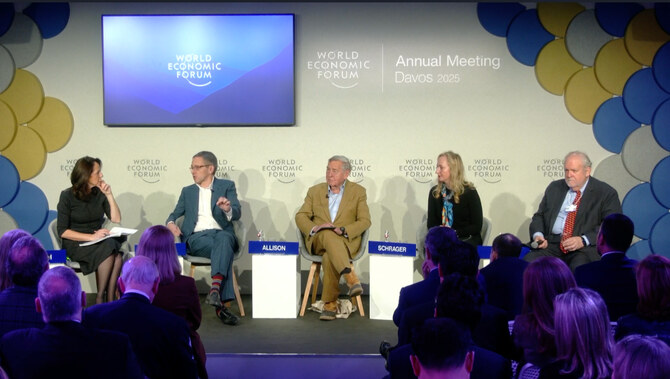DUBAI: Donald Trump’s US presidency will likely bring peace in Ukraine even if the future of the Middle East remains unclear, panelists at the World Economic Forum (WEF) in Davos said on Tuesday.
The annual meetings, which got into full swing on Tuesday, comes a day after Trump was sworn in for his second term as the 47th US president, marking perhaps the greatest political comeback in American history.
In one of the earliest sessions, a panel of political analysts and experts shared their “early thoughts” on Trump’s actions on his first day back in office as speculation rises about the implications of his presidency on the domestic and international fronts.
Graham Allison, Douglas Dillon Professor of Government at Harvard Kennedy School of Government, predicted the war in Ukraine would end within the next six months.
“If you look at [Trump’s] inaugural speech and the press conference, he wants to be not only a deal maker, but an international deal maker who’s a peacemaker,” said Allison, adding the new president would leverage his power to strike a deal with Ukraine President Volodymyr Zelensky or starve Kyiv of Washington’s military aid.
However, prospects of peace seem unclear in the Middle East, where a major paradigm shift took place last year with the decline of Iran and its proxies, as well as the new governments that rose to power in Syria and Lebanon.
Trump took credit for implementing a fragile ceasefire in Gaza after 14 months of negotiations.
“You can see a paradigm shift without peace. Israel has had a strategic problem since the 1940s (in) that it wins wars but cannot get to a stable peaceful arrangement. And I think that that remains the case,” said Walter Mead, Ravenel B. Curry III Distinguished Fellow in Strategy and Statesmanship at Hudson Institute.
He noted the decline of the “Iranian challenge” as the only factor destabilizing the Middle East was no guarantee of lasting peace in the Middle East.
“Peace in the Middle East perhaps remains a beautiful but maybe distant dream,” warned Mead.
Despite bringing a ceasefire in Gaza, Trump’s presidency does not signal guaranteed peace in Palestine given his desire to expand the Abraham Accords and resume pressure on Tehran.
Panelists warned of the consequences of Trump’s return to power.
Ian Bremmer, president and founder of Eurasia Group, warned against treating Trump as “just another president” given his victory despite impeachments and criminal indictments.
“It’s a very unusual time to have an individual that is in no way concerned about, or constrained by, rule of law,” said Bremmer, referring to the global power that Trump has amassed in light of America’s post-COVID-19 economic growth and tech dominance, combined with the weakening of Washington’s adversaries like China, Russia and Iran.
“To understand what Trump will do is to understand who pays him.”
In his first two days in office, Trump has already taken major decisions that include withdrawing the US from the World Health Organization and the Paris Agreement on climate change for the second time.
Although panelists signaled optimism towards his domestic economic policies, they disagreed on Washington’s projected relationship with China during his tenure.
“I think that we are heading towards a trade war and towards a more strategic decoupling of the economies. One reason for that is because Trump isn’t just focusing on tariffs on China, but he’s also focusing on third countries where there are pass-throughs to the US,” said Bremmer.
Trump unexpectedly held off tariffs on China on his first day back at the White House and delayed the ban on short video app TikTok. But in an unprecedented move he floated the possibility of a joint venture, saying he was seeking a 50-50 partnership between Washington and Chinese owner ByteDance.
“Getting to a deal with China will require a level of execution implementation that’s far more complicated across the Trump administration, not to mention some support from the GOP and Congress, and we’re nowhere close to that,” said Bremmer.
However, Allison predicted positive relations between both economic powers as their leaders enjoy a “very right relationship” and could find common areas of cooperation, including ending the war in Ukraine.
He added: “In terms of their interests, while fundamentally in the long run there is rivalry of a rising and ruling power, but if I look at the agency and the opportunities for agency here, doing a deal to conclude a war in Ukraine is not hard for [Xi Jinping] to be part of.”
World leaders, business titans, and policymakers gathered in Davos, Switzerland, for the WEF’s 55th annual meeting, which runs until Jan. 24.
This year’s conference explores ways to tackle shared challenges like climate change, technology, and economic inequality through global collaboration.



























